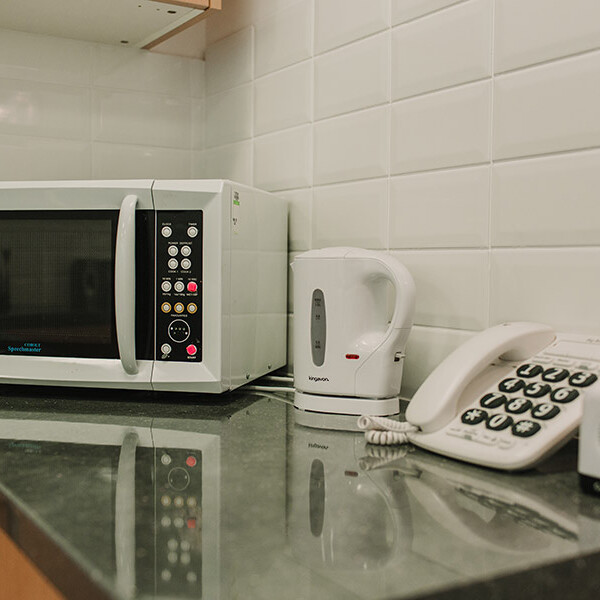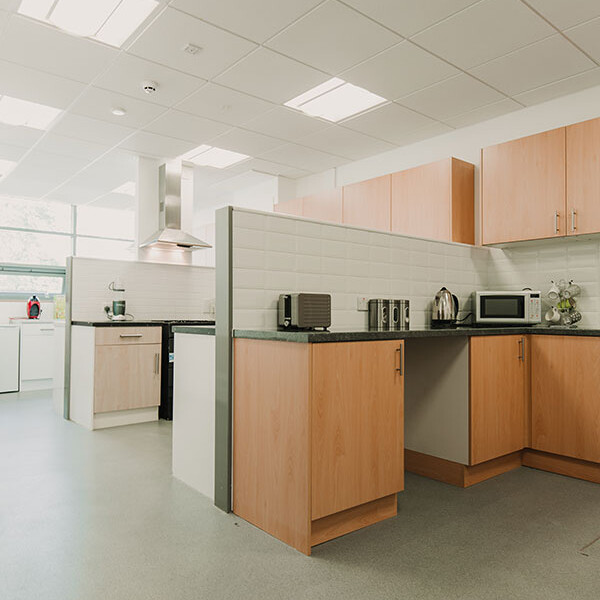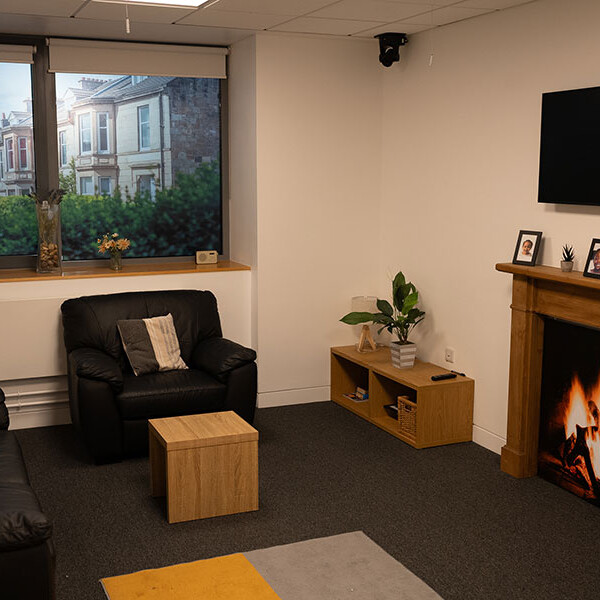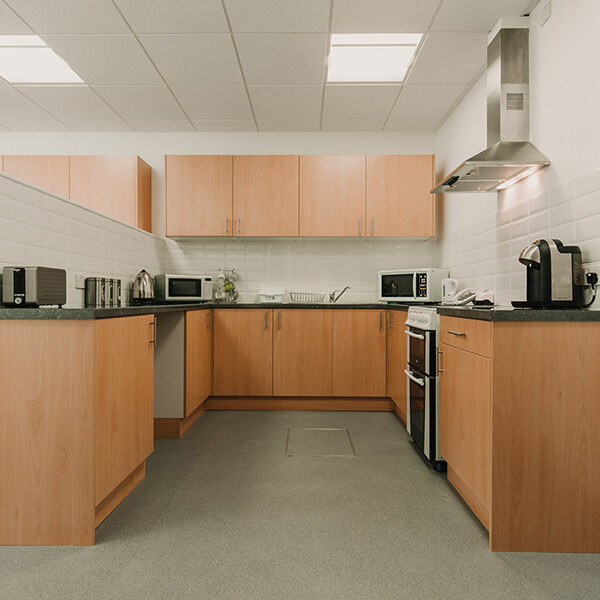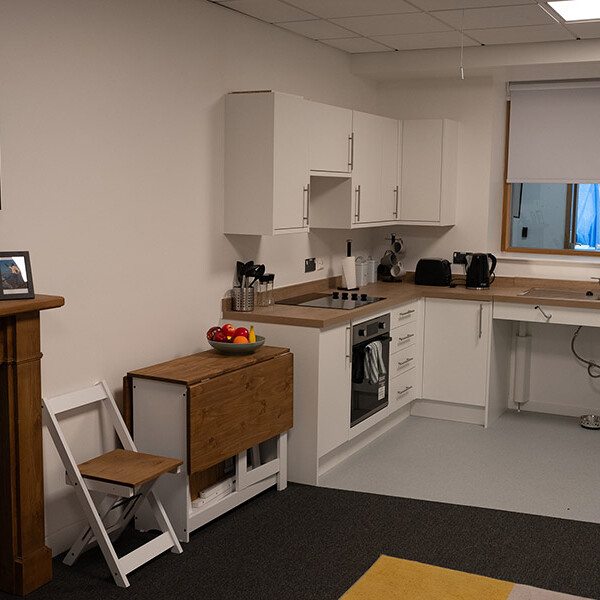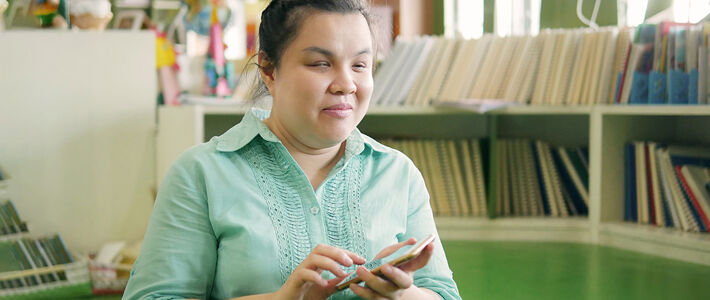
Qualified Habilitation Specialist (Children and Young People) – Top Up Degree - BSc (Hons)
Currently viewing course to start in 2025/26 Entry.
This course is ideal for those who have completed our FdSc Vision Rehabilitation Specialist course and wish to further develop their knowledge and become a Qualified Habilitation Specialist, focusing on the practical and emotional needs of children and young people with a vision impairment.
- Level Undergraduate
- Study mode Full Time/Part Time
- Award BSc (Hons)
- Start date September 2025
- Fees View course fees
- Subjects
- Location City South
This course is:
Overview
Qualified Habilitation Specialists are experts in relation to the practical and emotional aspects of vision impairment for children and young people (0-25 years). The BSc (Hons) Qualified Habilitation Specialist (Children and Young People) course is designed to develop you as a competent, independent, knowledgeable, and resourceful professional, ready for employment in the field of education and social care for children and young people with a vision impairment.
This course is currently the only BSc (Hons) Qualified Habilitation Specialist ‘top up’ degree for qualified Vision Rehabilitation Specialists in the United Kingdom. This course, which can be studied full-time or part-time, has been designed to enable qualified Vision Rehabilitation Specialists to continue their studies to achieve Level 6 study and full degree classification, and is the ideal progression for those who have completed our FdSc Vision Rehabilitation Specialist course.
What's covered in this course?
The philosophy of the programme is based on developing specialist knowledge in relation to children and young people’s development and vision impairment. This course encourages you to look at a range of potential issues to enable appropriate approaches when working with children and young people with a vision impairment. You will learn about the importance of effective communication and the development of a strong relationship with young people, parents and others involved in their support.
The course will give you an in depth understanding of baby, child, and adolescent development and how this can be affected by vision impairment. You will learn to apply established theories, strategies, and skills to a range of situations and populations, as well as reflect, evaluate, and improve upon your own practice. You will develop the knowledge you need to move from the adult social care sector into education settings that are governed by different legislation, practice, and procedures so that you are able to support children and young people with vision impairment from all cultures and backgrounds to develop the crucial life skills they will need to excel later in life.
Why Choose Us?
- We are currently the only university to offer a BSc (Hons) Qualified Habilitation Specialist programme to Rehabilitation Workers.
- This course has been running for over 10 years. We are highly experienced in providing training for rehabilitation workers.
- Your employability will be enhanced within your individual work setting.
- The curriculum has been designed with the National Quality Standards for the Delivery of Habilitation Training (Mobility and Independent Living Skills) for Children and Young People with Vision Impairment.
- The course is delivered by professional tutors who are rehabilitation and habilitation specialists.
- The course has been mapped against the Curriculum Framework for Children and Young people with Vision Impairment (CFVI).
Entry Requirements
These entry requirements apply for entry in 2025/26.
All required qualifications/grades must have been achieved and evidenced at the earliest opportunity after accepting an offer to help confirm admission and allow for on-time enrolment. This can also include other requirements, like a fee status form and relevant documents. Applicants can track their application and outstanding information requests through their BCU mySRS account.
Essential requirements
The key entry requirement for this programme is the attainment of level 4 and 5 qualifications in Rehabilitation Work (Visual Impairment).
Candidates must hold one of the following:
- Foundation Degree in Rehabilitation Work (Visual Impairment) / Vision Rehabilitation Specialist (Adults): 240 credits with 120 at level 5
- Diploma in Higher Education in Rehabilitation Studies (Visual Impairment): 240 credits with 120 at level 5
- Foundation Degree in Health and Social Care in Rehabilitation Studies (Visual Impairment): 240 credits with 120 at level 5
Candidates who do not hold one of the above but have evidence of a level 4 certificate (e.g., Rehabilitation Officer Certificate; Mobility Instructor and Technical Officer Certificates) will be required to submit a CPD portfolio (worth up to 60 credits) and successfully complete the level 5 (15 credit) module ‘APL/Advanced Writing Skills’ module with an associated profile of experiential learning worth up to 45 credits in advance of an offer being made.
All prospective candidates should have good working knowledge of Grade 2 Braille (equivalent of Lesson 22 in the RNIB Braille Primer). Students who need to upgrade their Braille knowledge to encompass Unified English Braille will find supportive learning and teaching resources available on the Birmingham City University Moodle pages.
The course starts in September each year. Applicants will be selected on the basis of the information provided in their application forms and two submitted references.
See 'Additional information', below, for further requirements.
If you have a qualification that is not listed, please contact us.
Fees & How to Apply
UK students
Annual and modular tuition fees shown are applicable to the first year of study. The University reserves the right to increase fees for subsequent years of study in line with increases in inflation (capped at 5%) or to reflect changes in Government funding policies or changes agreed by Parliament. View fees for continuing students.
Award: BSc (Hons)
Starting: Sep 2025
- Mode
- Duration
- Fees
- Full Time
- 1 year
- £5,160 in 2025/26 ✱ Important note for this price
- Part Time
- 2 years
- £860 per 20 credit module ✱ Important note for this price
(↩Back to price) * The Government is proposing to increase the cap on full-time regulated tuition fees to £9,535 for 2025/26 and the University is planning on increasing fees to that maximum level once legislation is enacted. Part-time fees are charged pro-rata, where applicable.
International students
Sorry, this course is not available to International students.
Application deadlines
We advise you to apply early to allow sufficient time for you to prepare to start your studies in September. Please apply by Friday 18 July to allow time to prepare for the course.
Late applications will be accepted where places are still available, but please note that the course starts on 1 September 2025.
Guidance for UK students
UK students applying for most undergraduate degree courses in the UK will need to apply through UCAS.
The Universities and Colleges Admissions Service (UCAS) is a UK organisation responsible for managing applications to university and college.
Applying through UCAS
Register with UCAS
Login to UCAS
Complete your details
Select your course
Write a personal statement
Get a reference
Pay your application fee
Send UCAS your application
Our advice for applying to a health care course
Applying for a course and preparing for an interview can be a daunting process, so we have created a series of films to help you through the process, including what to put in your personal statement.
You can apply directly to join this course using the University online application link.
Successful applications will lead to an interview. These can be conducted via telephone although we recommend that you visit the campus.
To support your application and your prospects for being successful at selection, please consider the following suggestions:
- Think carefully about how you will be able to commit to the course especially if you are in full time employment. You will need to consider course attendance, practice placements and observational days, independent study and your other life commitments.
- Observe a Vision Rehabilitation Specialist in your local area to learn more about the profession.
- Read more about the profession, for example by exploring relevant websites.
Personal statement
Your personal statement is a highly important part of your application. It gives you a crucial opportunity to say why you’re applying and why the institution should accept you.
Here are the key areas you’ll need to address:
Course choice
Why does this course appeal? What areas are of particular interest?
Career plans
If you have a specific career in mind, say how your chosen course will help you pursue this goal.
Work experience
Mention any work that is relevant to your subject, highlighting the skills and experience gained.
School or college experience
Highlight skills gained at school/college, eg summer schools or mentoring activities.
Non-accredited skills or achievement
eg Duke of Edinburgh Award, Young Enterprise scheme.
You should also mention your future plans – if you’re planning to take a year out, don't forget to give your reasons. Talk about any subjects you’re studying that don’t have a formal assessment and any sponsorships or placements you’ve applied for. And don't be scared to add in details about your social, sports or leisure interests.
Get more information on writing personal statements.
Course in Depth
Modules
Early Child Development 20 credits
Transition One 20 credits
Middle Childhood Development 20 credits
Transition Two 20 credits
Adolescent Development 20 credits
Evidence Based Practice and Placement 20 credits
Download course specification
Download nowThe course is a blend of face to face teaching blocks, independent study and work-based learning placements.
- Face to face teaching blocks
- Independent study
- Practice placements and observational days
- Assessment
Face to face teaching blocks
Teaching is organised into four week-long blocks for the full time course option and two weeks per year for the two year part time option. These intensive Group Learning weeks (GL weeks) give you the advantage of uninterrupted training in a convenient form. This allows you to travel to Birmingham from all over the UK to attend teaching weeks. During these weeks many students stay in local hotel accommodation.
There will be interactive classroom based lectures, group discussions, debates and presentations that may range from the application of theoretical concepts to the study of practical habilitation programmes. Due to the nature of the role, you will experience many practical teaching sessions through simulation activities in order to ensure that you are adequately prepared for practice.
In addition, during these weeks, you’ll have the chance to take part in the following activities:
- Skills practice time in our resource rooms and training kitchens.
- Group sessions.
- One to one tutorials.
- Library research sessions.
- IT support and training.
- Support with academic writing.
The part time study route is recommended for individuals in full time employment.
Independent study
When away from University, we recommend you have at least one or two study days per week. This is to allow dedicated time for independent study and observation of practice days.
All the course and module information can be accessed and downloaded from our virtual learning environment called, Moodle. Moodle is updated with useful information, key resources, assessment briefs and forthcoming teaching resources. You can interact with other students via online forums to discuss module content and to ask general questions to course tutors. Your assignments will also be submitted through Moodle.
Practice placements and observational days
You will complete a 20 practice placement days towards the end of your course. This is so that you can demonstrate your competence in delivering Habilitation services of a high standard.
Throughout the course you will also complete 10 observations of practice days. This is the opportunity to shadow and learn from experienced practitioners who are delivering a range of different service for children and young people with a vision impairment.
Assessment
You will be provided with detailed assessment instructions through dedicated face-to-face assessment briefing sessions and written assessment documents.
The course team use a broad mix of assessment methods to reflect the types of work you will be doing in practice. These include:
- Professional discussions
- Placement portfolios
- Viva voce (oral question and answer exams)
- Case study analysis
- Presentations
Accreditation or professional associations
This course is recognised by the Professional Body HabVIUK. Students are eligible for free membership during their studies, which entitles you to access all the resources on the website and subsidised entry to the HabVIUK annual conference.
The course is recognised by the Rehabilitation Workers Professional Network (RWPN). You will be given free membership of this organisation whilst you are studying on the course which will allow you access to their online resources.
Employability
Enhancing Employability Skills
You will progress and develop to become a pro-active, highly effective problem solver whose reflective and evidence based practice will enhance future service provision through the delivery of high standards of professional practice
Embedding contributions, feedback and knowledge of best practice from practice partners, stakeholders and recognised experts; the applications of the theoretical principles in habilitation practice settings will enable you to work effectively as part of a multi-disciplinary team.
You will participate in inter-professional learning to broaden your intellectual, analytical and judgement skills and enhance your communication with and awareness of diversity in culture and lifestyle amongst colleagues and children and young people
You will demonstrate the competence required to practice as a specialist habilitation worker with the transferable skills, knowledge and ability to be a leading practitioner who is able to work with a diverse range of children and young people who have a vision impairment and associated needs.
Through engagement with the evidence base and incorporating opportunities to consider global habilitation, perspectives are considered to enable you to practice effectively and to ensure that you are sensitive to the needs of the diverse cultures that you may encounter.
Successful completion of this accredited course enables you to apply for registration with Habilitation VI UK, the professional body, for Qualified Habilitation Specialist status. Combined with your existing rehabilitation qualification – you would be recognised as ‘dual qualified’ and able to work with individuals of all ages.
Placements
Ten days of observations of practice and the final placement are crucial aspects of the course. Observational days enable you to observe and learn from a wide range of experts who provide children and young people services. These might include habilitation workers, qualified teachers for the vision impaired and optometrists. These days are threaded throughout the course.
The practice placement is for twenty days towards the end of the course. You will be linked with a school or specialist team to deliver habilitation services. You will have a mentor from the service provider and support from the habilitation team at BCU. Placements are the opportunity for you to apply your knowledge and skills. They are the perfect way to demonstrate your fitness for practice.
Facilities & Staff
We have invested over £400 million in our facilities, including an upgrade to our Skills and Simulation facilities at City South Campus. We boast up-to-date, innovative facilities that simulate the real situations that you may come across in the workplace. These resources are essential in offering you a hands-on introduction to health and social care practice.
Home Environment Room
This space is used to simulate non-clinical settings, as not everything health professionals deal with is hospital based. This is used for simulations of activities such as home visits, home births and supporting people to become independent in their own home.
Assisted Living Space
This space replicates a flat and is used for scenarios such as home visits. The sitting room area provides a different space to practise skills and simulations and work with service users and other students.
Assisted Kitchen
This specially designed kitchen has different areas where you can practice cooking, cleaning, boiling the kettle etc., with someone who has actual or simulated vision impairment. There are adapted devices to help, and simulation glasses for you to wear to experience vision impairment.
Teaching staff
Staff teaching on this course are highly experienced in the field and still work as practitioners alongside their teaching role.
Cally Pocock
Cally is dual qualified as a Qualified Habilitation Specialist and Vision Rehabilitation Specialist. She has been lecturing on the Habilitation course since 2021. In her day-to-day practice role, Cally is the Qualified Habilitation Specialist for Wiltshire. She is also a Play Leader within a specialist district centre for pre-school children with additional needs, and has worked as a specialist support assistant for Hearing and Vision Support teams within her Local authority SIPMS service.
Fiona Broadley
Fiona has been fundamental in co-designing and teaching the Habilitation Course since it started. Fiona initially trained as a mobility instructor in 1981. She has also studied mobility and children and trained in relation to Independent Living Skills in 1999. Since 1994, Fiona has been the Senior Habilitation Specialist (Senior Mobility Officer) at Priestley Smith School Birmingham City Council. She is the Chair of Habilitation Vision Impairment UK – the Professional Body. She has also published on a range of topics related to Habilitation and supporting children with vision impairment.
Our staff
David Bignell
Course Lead BSc (Hons) Qualified Habilitation Specialist (Children and Young People)
David is the Course Lead for BSc (Hons) Qualified Habilitation Specialist. David has also been the Course Lead for the Foundation Degree in Rehabilitation Work (Vision Impairment) and the BSc (Hons) Specialist Complex Needs Rehabilitation Work top up degree.
More about David
